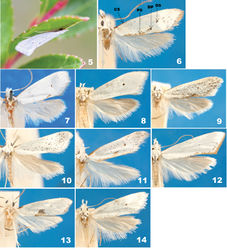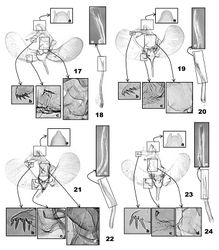Difference between revisions of "Eucalantica ehecatlella"
m (Imported from ZooKeys) |
m (1 revision) |
(No difference)
| |
Latest revision as of 16:07, 13 July 2011
| Notice: | This page is derived from the original publication listed below, whose author(s) should always be credited. Further contributors may edit and improve the content of this page and, consequently, need to be credited as well (see page history). Any assessment of factual correctness requires a careful review of the original article as well as of subsequent contributions.
If you are uncertain whether your planned contribution is correct or not, we suggest that you use the associated discussion page instead of editing the page directly. This page should be cited as follows (rationale):
Citation formats to copy and paste
BibTeX: @article{Sohn2011ZooKeys118, RIS/ Endnote: TY - JOUR Wikipedia/ Citizendium: <ref name="Sohn2011ZooKeys118">{{Citation See also the citation download page at the journal. |
Ordo: Lepidoptera
Familia: Yponomeutidae
Genus: Eucalantica
Name
Eucalantica ehecatlella Sohn & Nishida sp. n. – Wikispecies link – ZooBank link – Pensoft Profile
Type material
Holotype ♂ – COSTA RICA: Heredia, Volcán Barva, 6 km ENE from Vara Blanca, 10°10'34"N; 84°06'41"W, alt. 1950–2050 m, 16 February 2002, BN-INB0003220413, GSN [SJC 642] (INBIO). Paratype ♂ – COSTA RICA: same locality as holotype, 21 March 2002, A Kawahara, BN-INB0003217116, abdomen missing (INBIO).
Diagnosis
This species is very close to Eucalantica icarusella in the shape of the dorsal patch of the forewing and in having entirely pale gray forewing fringes but differs from the latter by having most of the black dots sparsely scattered beyond the discal cell. Eucalantica ehecatlella is further distinguished from Eucalantica icarusella by the lack of projections near the apex of uncus in the male genitalia.
Description
(Fig. 6). Forewing length 5.0–6.2 mm (n=2) with dark brown costal streak in basal 1/4; posterior suffusion on basal half of dorsal margin, reddish brown with an intermittent, black line along upper border; black spots sparsely scattered on distal 1/4; terminal line narrow, black, intermittent; fringes pale orange, paler on tornus. Hindwing anterior margin 2× longer than maximum width; fringes pale gray.
Male genitalia
(Figs 21, 22) (1 preparation examined). Uncus (Fig. 21a) elongate, triangular, conical apically; socii bulged dorsally, sharp triangular in terminal 1/5, 1.5× longer than saccus, long-hairy dorsally, with four terminal spines in a row, third spine from tip longest, followed by second, fourth, and first in order of length (Fig. 21b). Tegumen parallel-sided; subscaphium (Fig. 21d) slightly bulged ventrad. Valva obovate, costal margin almost straight, apex broadly round; a semicircular emargination adjoining with a densely setose area and an oblique groove above saccular base (Fig. 21c); a subrectangular emargination near the middle of the base of valva ventrally (Fig. 21c). Saccus elongate, digitate, as long as uncus. Aedeagus (Fig. 22) of even width throughout, strongly curved medially, with a triangular carina terminally and a zone of minute-spinulate cornuti 1/3 as long as aedeagus.
Female
unknown.
Distribution
Costa Rica (Central Volcanic Range in Heredia Province).
Etymology
The specific epithet is derived from ‘Ehecatl', a god of wind in Aztec mythology and refers to the windy habitat where the new species was collected.
Original Description
- Sohn, J; Nishida, K; 2011: A taxonomic review of Eucalantica Busck (Lepidoptera, Yponomeutidae) with descriptions of six new species ZooKeys, 118: 75-96. doi
Images
|

